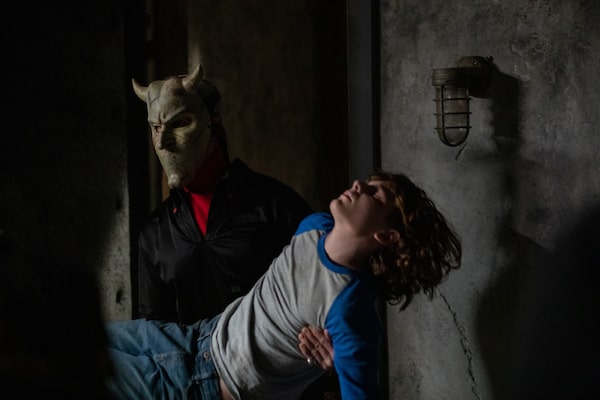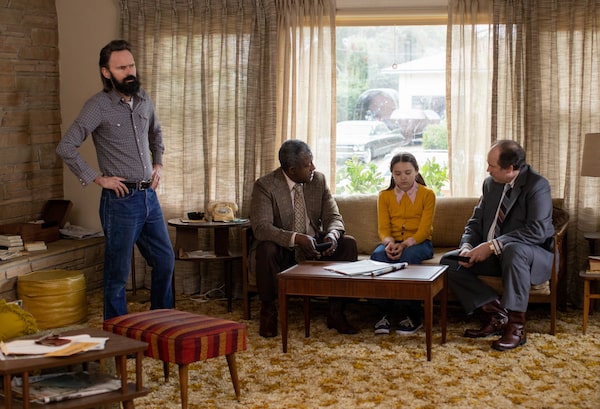
Ethan Hawke as The Grabber and Mason Thames as Finney Shaw in The Black Phone.Photo Credit: Fred Norris/Universal Pictures/Universal Pictures
The Black Phone
Classification: R; 102 minutes
Directed by Scott Derrickson
Written by Joe Hill, Scott Derrickson and C. Robert Cargill
Starring Mason Thames, Madeleine McGraw and Ethan Hawke
Opens in theatres June 24
As far as horror goes, telephones have always enjoyed a devilish status. They are disconnected in times of need, thrown out of reach in moments of struggle, struggling to get service or daring to be answered so that they can spew forth taunts, threats and warnings that, indeed, the call is coming from inside the house.
With The Black Phone, the latest horror flick from Scott Derrickson, the phone is repurposed into a means of advice and guidance. Much of the team that worked on Derrickson’s 2012 audience favourite Sinister (producer Jason Blum, co-writer C. Robert Cargill, co-star Ethan Hawke) is on board here as well. Set in 1978 Denver, the film follows 13-year-old Finney (Mason Thames), a shy but discerning boy, who is kidnapped off the street by a serial child-murderer known only as the Grabber (Hawke).
Adapted from the short story of the same name by writer Joe Hill (perhaps better known as the son of horror legend Stephen King), The Black Phone trades in the supernatural and psychological more than it does the urgent terror of a jump scare or brutal depictions of violence. While Derrickson and his team make great work of establishing its period setting (the costuming, soundtrack, and general feel of late 1970s middle America are all realized quite wonderfully here), its main focus is on Finney as he tries his best to escape from the creepy and vile basement that the Grabber has confined him to.
Bare except for a dingy mattress on the floor, some discarded rugs and other household odds and ends, the basement features a black, wall-mounted rotary phone – although the Grabber warns that it is clearly disconnected, with its cut cord hanging loose, Finney begins to receive ominous calls from the other boys he had previously victimized. While his kidnapper offers a sparse series of tests to goad the boy into a supposedly earned violent punishment, young Finney is able to adapt to both his garish surroundings as well as the Grabber’s sadist machinations through the help of the boys on the phone. Although we were previously witness to Finney being viciously bullied and harassed at school, here, in the bleakest of circumstances and with the ghostly camaraderie of the boys on the phone, he is able to rise to the occasion and fend for himself.

From left: Jeremy Davies as Terrence Shaw, E. Roger Mitchell as Detective Wright, Madeleine McGraw as Gwen Shaw and Troy Rudeseal as Detective Miller.Photo Credit: Fred Norris/Universal Pictures/Universal Pictures
Alongside this supernatural element are also the clairvoyant abilities of his younger sister Gwen (Madeleine McGraw), a gutsy and smart-mouthed girl, who is quick to jump in (literally) to defend her brother, even if it leaves her bloodied and bruised. McGraw here steals the show with her deftness in portraying Gwen, equally defiant as she is empathetic, and sharp as a whistle in her takedowns of the bush-league adults in her midst.
Even as the film is unsure how exactly to best harmonize its various elements (Gwen and her abilities among them), it is deferential to the siblings, both of whom are talked down to, dismissed or abused by the adults in their lives. In this vein, the best part of The Black Phone is the respect it has for the many children that it portrays and its ability to show the raw reality of what childhood looked like for many in the 1970s.
This is in contrast to the adults we see, most notably the Grabber, and Gwen and Finney’s abusive father, Terrence, both of whom lack depth and a sense of purpose beyond the most immediate one of basic storytelling and narrative development. While the kids’ inner lives and story worlds are strikingly built out (Bruce Lee fan and Finney’s de facto protector and classmate Robin is a particular favourite), the adults come to us half-baked, even goofy at times. They functionally move the plot forward, but their screen time feels more like a hindrance than a benefit.
It’s a misstep that only adds to the unevenness of Derrickson’s film, which, in the end, feels unsure of how to fully and precisely unify all of its moving pieces. It’s a combination of characters that are remarkably charismatic and characters that feel akin to caricature; of supernatural elements that are organically realized and others that feel overly theatrical, even cheap in their undertaking.
The Black Phone is an enjoyable watch, for sure, but it lacks a certain agility, which keeps it from being as great as we want it to be.
Plan your screen time with the weekly What to Watch newsletter. Sign up today.